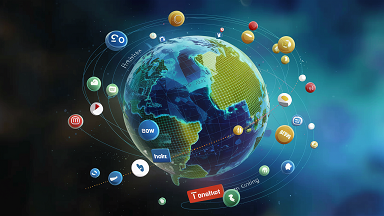
International Brand Expansion
In today’s interconnected world, taking your brand global isn’t just an ambitious growth strategy – it’s a necessity for businesses aiming to maximize their reach and potential.
However, International Brand Expansion is a delicate mission fraught with complexities. It requires a meticulous approach to adapt your brand to new markets while maintaining its core identity.
Here, we delve into the key considerations for Mastering the Art of International Brand Expansion on the world stage.
1. Understanding Market Nuances
Before setting foot in a new market, it’s crucial to grasp the cultural, economic and regulatory outlook. What works in one country may not resonate in another due to different consumer behaviors, preferences and values.
Conducting thorough market research is essential to tailor your products, marketing strategies and business operations to local tastes and norms.
Cultural Sensitivity and Adaptation
Cultural intelligence is the bedrock of successful global branding. Misunderstandings or insensitivity to local culture can lead to marketing blunders, harming your brand’s reputation.
Brands must ensure that their messaging, imagery and overall brand persona are culturally appropriate and resonate with the local audience.
Regulatory Compliance
Each country has its own set of rules and regulations governing business operations, product standards and marketing practices.
Ensuring compliance with these regulations is paramount to avoid legal pitfalls and maintain your brand’s integrity.

2. Strategic Market Entry
Deciding how to enter a new market is as critical as choosing the right market.
Whether through exporting, franchising, joint ventures or direct investment, each mode of entry has its advantages and challenges. It’s vital to assess the risk-reward ratio and choose a strategy that aligns with your brand’s goals and resources.
Local Partnerships
Forming alliances with local businesses can offer invaluable insights into the market, help navigate legal and bureaucratic hurdles and provide established distribution channels.
However, selecting the right partner requires thorough due diligence to ensure alignment with your brand’s values and objectives.

3. Consistent Yet Adaptable Branding
While it’s essential to adapt to local markets, your brand’s core identity should remain consistent.
This balancing act ensures that your brand is recognizable and reliable across borders while being flexible enough to appeal to local tastes.
Localized Marketing Strategies
Marketing strategies should be tailored to the local audience’s media consumption habits, preferences and cultural nuances. This may involve adjusting your product’s positioning, messaging and even the marketing channels you use.

4. Supply Chain Management
Global expansion can complicate your supply chain, introducing challenges like longer lead times, increased costs and greater complexity in logistics.
Efficiently managing your supply chain is crucial to ensure timely delivery, maintain product quality and control costs.
Local Production vs. Exporting
Deciding whether to produce locally or export your products is a significant decision that impacts your supply chain strategy.
Local production can reduce shipping costs and lead times but may involve higher production costs or regulatory hurdles. Conversely, exporting allows you to maintain centralized production but can add complexity and risk to your supply chain.

5. Talent Acquisition and Management
Building a competent local team is vital for your expansion success.
Employees who understand the local market can offer insights that are crucial for your business to resonate with the local audience.
Adopting Diversity
Global expansion offers the opportunity to adopt diversity, bringing different perspectives and ideas to your brand. A diverse team can enhance creativity, foster innovation and improve problem-solving.

6. Technology and Digital Transformation
Leveraging technology can facilitate market entry and expansion.
From digital marketing to e-commerce platforms, technology can help you reach new customers, gather market insights and streamline operations.
Data-Driven Decisions
In the digital age, data is invaluable for understanding market trends, consumer behavior and the competitive marketplace. Utilizing data analytics can guide your strategic decisions and help you adapt your approach based on real-time insights.

7. Building Brand Loyalty
Establishing a loyal customer base in a new market is essential for long-term success. This involves not only attracting customers but also retaining them through consistent quality, excellent customer service and ongoing engagement.
After-Sales Service
The relationship with your customers doesn’t end at the point of sale.
Providing excellent after-sales service can enhance customer satisfaction, foster loyalty and generate positive word-of-mouth.

8. Crisis Management and Resilience
Expanding globally exposes your brand to new risks and potential crises, from economic downturns to political instability.
Having robust crisis management plans and the ability to adapt quickly is crucial to navigate these challenges and sustain your global presence.

Conclusion
Unveiling your brand on the world stage is a complex but rewarding task.
It requires a strategic approach, deep market understanding and the agility to adapt to diverse and ever-changing environments.
By addressing these key considerations, businesses can navigate the complexities of International Brand Expansion, adapt their brand to resonate with new audiences and achieve sustained success on the international stage.















Thanks for sharing. I read many of your blog posts, cool, your blog is very good.
Thanks for sharing. I read many of your blog posts, cool, your blog is very good.